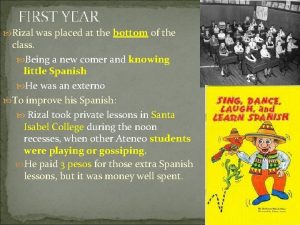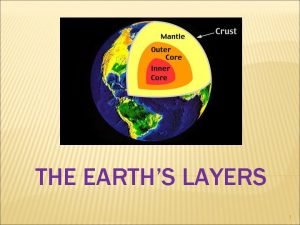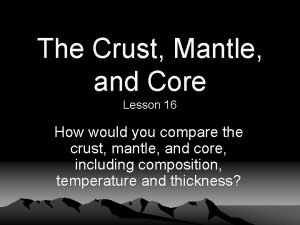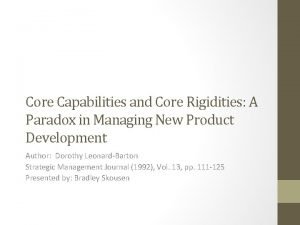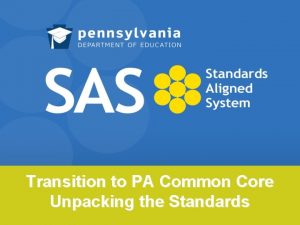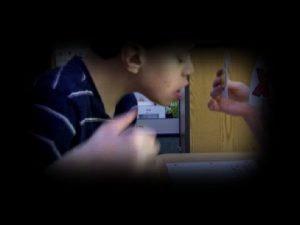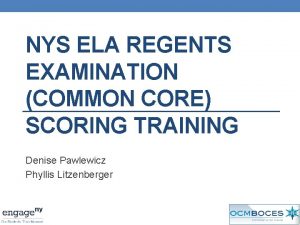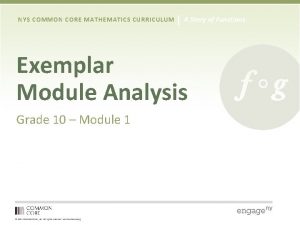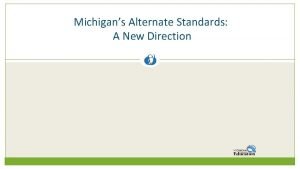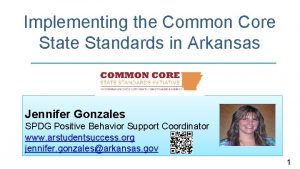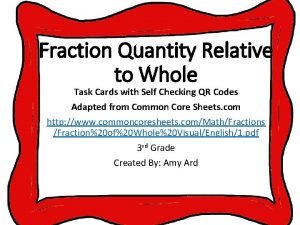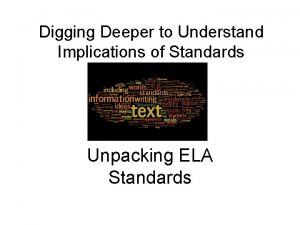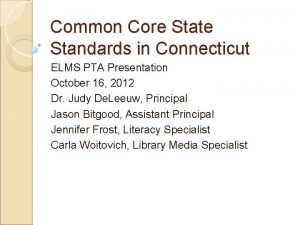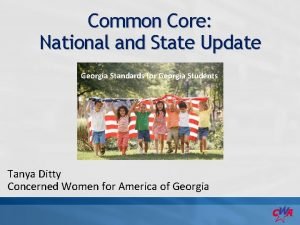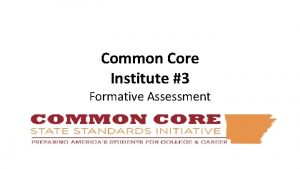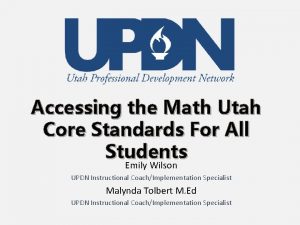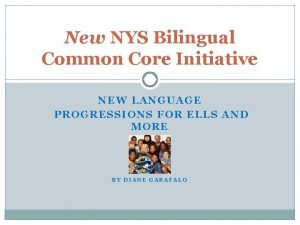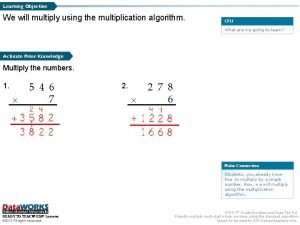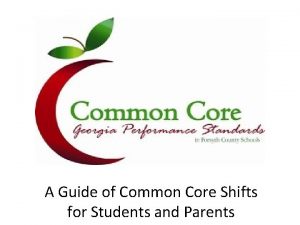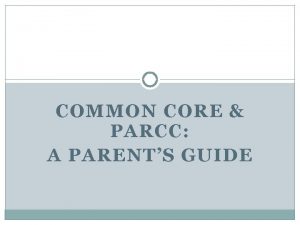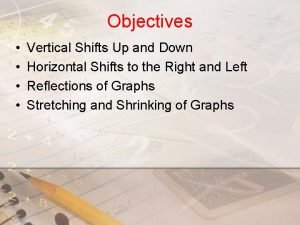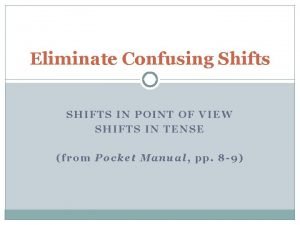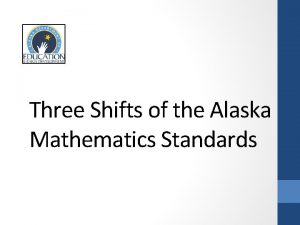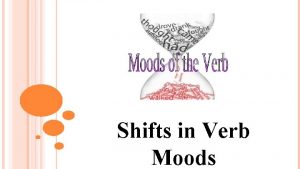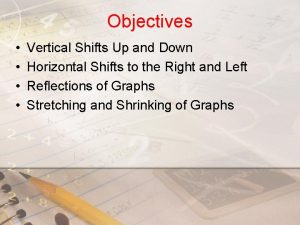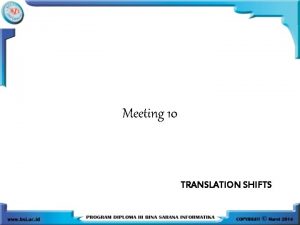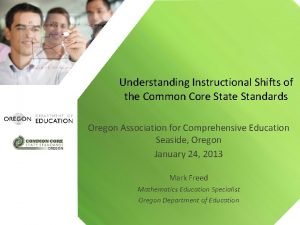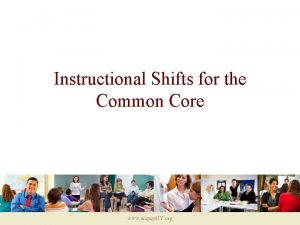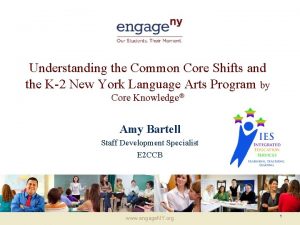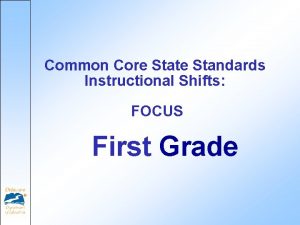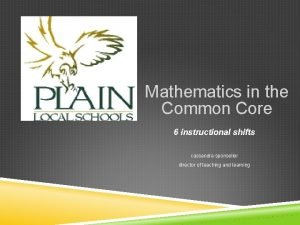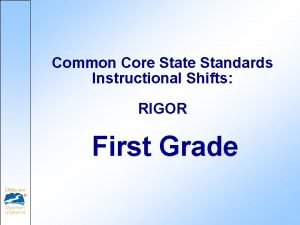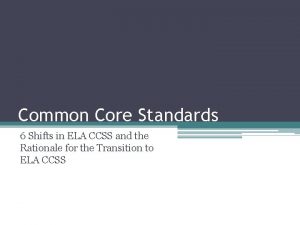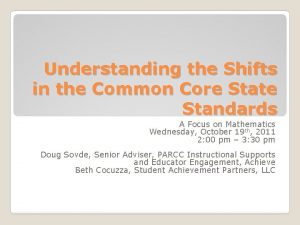A Guide of Common Core Shifts for Students




















- Slides: 20

A Guide of Common Core Shifts for Students and Parents

Shifts in the CCGPS 6 Shifts in ELA/Literacy 6 Shifts in Mathematics • Read as much non fiction as fiction • Learn about the world by reading • Read more challenging material closely • Discuss reading using evidence • Write non-fiction using evidence • Increase academic vocabulary • Focus: learn more about fewer, key topics • Build skills within and across grades • Develop speed and accuracy • Really know it. Really do it. • Use it in the real world • Think fast AND solve problems

ELA/Literacy Shift 1: Read as much non-fiction as fiction Student must… Parents can… • Read more non-fiction • Know the ways nonfiction can be organized • Enjoy and discuss the details of non-fiction • Supply more nonfictions text • Read non-fiction texts aloud or with your child • Enjoy non-fiction text in front of your child

ELA/Literacy Shift 2: Learn about the world by reading Students must… Parents can… • Learn more Science and Social Studies through reading • Use “primary source” documents • Learn more by using texts • Provide series of texts on topics of interest • Find books that explain • Discuss non-fiction texts and the ideas within the text

The more we read, the more we can read! • By age 3, children from affluent families have heard 30 million more words than children from parents living in poverty. (Hart and Risley, 1995). • Children who have larger vocabularies and greater understanding of spoken language do better in school (Whitehurst and Lonigan). • If children aren’t reading on grade level by third grade, they are four times more likely to leave high school without a diploma (Hernandez, 2011).

ELA/Literacy Shift 3: Read more complex material carefully Students must… • Re-read • Read material at comfort level AND work with more challenging text • Break down text to understand • Handle frustration with text and keep reading Parents can… • Provide more challenging texts AND provide text they WANT to read and can read comfortably • Know what is grade level appropriate • Read challenging text with them • Show that challenging text is worth reading and discussing

Support their Reading. Read Challenging Texts Aloud. Grades Examples of Non-fiction Examples of Fiction K-1 A Tree is a Plant Fire, Fire! (Read aloud) Are You My Mother? The Owl and the Pussycat (Read aloud) 2 -3 Martin Luther King and the March Fire Cat on Washington Charlotte’s Web (Read aloud) What the World Eats! (Read aloud) 4 -5 Hurricanes: Earth’s Mightiest Storms The Kids Guide to Money Bud not Buddy The Secret Garden 6 -8 Narrative of the Life of Frederick Douglass A Night to Remember Little Women The People Could Fly 9 -10 Hope, Despair, Memory Letter from Birmingham Jail Things Fall Apart In the Time of Butterflies 11 -12 Take the Tortillas Out of Your Poetry Mother Tongue The Canterbury Tales Crime and Punishment

ELA/Literacy Shift 4: Discuss reading using evidence Students must… Parents can… • Find evidence to support their arguments • Form judgments • Become experts through reading • Discuss what the author is trying to do with the text • Talk about text • Ask for evidence in every day discussions/ disagreements • Read aloud or read the same book and discuss with evidence to support conversation

ELA/Literacy Shift 5: Writing from Sources Students must… Parents can… • Make arguments in writing using evidence • Compare multiple texts in writing • Practice writing well • Encourage writing at home • Write “books” together and use evidence/details

ELA/Literacy Shift 6: Academic Vocabulary Students must… • Learn the words that they can use in college and career • Read more to develop a larger vocabulary Parents can… • Read often and constantly with babies, toddlers, preschoolers, and children • Read multiple books about the same topic • Let your children see you reading • Talk to your children; Read to your children; Listen to your children; Sing with your children

Mathematics Shift 1: Focus: Learn more about less Student must… Parents can… • Spend more time on fewer concepts • Know what the priority work is for your child at their grade level • Spend time with your child on priority work • Ask your child’s teachers about their progress on priority work

Mathematics Shift 2: Skills Across Grades Students must… Parents can… • Keep building on learning year after year • Be aware of what your child struggles with last year and how that will affect learning the this year • Advocate for your child and ensure that supports are given for gaps in learning

The National Mathematics Advisory Panel Final Report (2008) Success in College Success in Algebra Success with Fractions Success with Adding/Subtracting/ Multiplying/Dividing Positive and Negative Numbers

Mathematics Shift 3: Speed and Accuracy Students must… Parents can… • Spend time practicing lots of problems on the same concept • Push children to know/memorize basic math facts • Know all of the fluencies your child should have at the different grade levels

Key Fluencies Grade Required Fluency K Add/subtract within 5 1 st Add/subtract within 10 2 nd Add/subtract within 20 (addition/subtraction facts) Add/subtract within 100 3 rd Multiply/divide within 100 (multiplication/division facts) Add/subtract within 1, 000 4 th Add/subtract within 1, 000 5 th Multi-digit multiplication Multi-digit division 6 th Multi-digit decimal operations 7 th Solve px + q=r, p(x + q)=r 8 th Solve simple 2 x 2 systems by inspection

Mathematics Shift 4: Know it/Do it! Student must… • Understand why the math works. Make the math work. • Talk about why the math works • Prove that they know why and how the math works Parents can… • Notice whether your child really knows why the answer is what it is • Advocate for the time your child needs to learn key math skills • Provide time for your child to work hard with math at home • Try to know the math your child needs to know

Current Sample Test Item 5 th Grade Math Samantha is making an Apple Crumb Pie using the ingredients below. Apple Crumb Pie Crumb Filling 3/4 cup flour 4 cups sliced apples 1/3 cup sugar 1/4 cup butter 1/2 cup raisins How much total sugar must Samantha use to make the pie crumb and filling? a. b. c. d. 7/12 cup 2/6 cup 3/4 cup 2/3 cup

Example Common Core Performance Task: 5 th Grade Math Stuffed with Pizza John and Daniel are stuffed with pizza. John ate one-fourth of a cheese pizza, three-eighths of a pepperoni pizza, and one-half of a mushroom pizza. Daniel ate five-eights of a cheese pizza, and the other half of the mushroom pizza. All of the pizzas were the same size. John says he ate more pizza than Daniel because Daniel did not eat any pepperoni pizza. Daniel says they each ate the same amount of pizza. Who is correct? Show all of your mathematical thinking.

Example Annotated Student Work By drawing a diagram, the student is able to make sense of the problem. The student knows to find equivalent fractions to help solve the problem. The student models with mathematics. The diagram is accurate, labeled and a key is provided.

Additional Common Core Resources • www. georgiastandards. org • www. pta. org/4446. htm • www. corestandards. org
 Rizal was involved in student demonstration in madrid.
Rizal was involved in student demonstration in madrid. Inner core and outer core
Inner core and outer core Crust earth definition
Crust earth definition Crust outer core inner core mantle
Crust outer core inner core mantle Core rigidity
Core rigidity Unpacking common core standards
Unpacking common core standards Common core essential elements
Common core essential elements Nys ela regents part 3 rubric
Nys ela regents part 3 rubric Nys common core mathematics
Nys common core mathematics Essential elements michigan
Essential elements michigan Common core state standards arkansas
Common core state standards arkansas Common core sheets.com
Common core sheets.com Unpacking standards template
Unpacking standards template Connecticut common core state standards
Connecticut common core state standards Common core standards georgia
Common core standards georgia What does olivia mean
What does olivia mean Utah core math standards
Utah core math standards 4th grade math jeopardy common core
4th grade math jeopardy common core Bilingual common core standards
Bilingual common core standards Common core lattice multiplication
Common core lattice multiplication Common core state standards missouri
Common core state standards missouri
